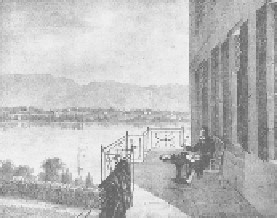Geoscience Reference
In-Depth Information
cooling of 1816, human hearts are “chill'd” along with the atmosphere. This is Byron's
Apoca-
lypse Now
. The fragile edifice of civilization has crumbled—no cities, no agriculture—leaving
a traumatized human remnant to wander across a scene of biblical desolation:
Figure 3.6.
Lord Byron on his balcony at the Villa Diodati by Lake Geneva. Here, at perhaps the most
famous rented address in British literary history, he played host to the Shelleys in the summer of 1816,
witnessed the great storm of June 13, and wrote the apocalyptic poem “Darkness.” (Print Collection, Miri-
am and Ira D. Wallach Division, New York Public Library.)
The brows of men by the despairing light
Wore an unearthly aspect, as by fits
The flashes fell upon them; some lay down
And hid their eyes and wept; and some did rest
Their chins upon their clenched hands, and smiled;
And others hurried to and fro, and fed
Their funeral piles with fuel, and looked up
With mad disquietude on the dull sky,
The pall of a past world; and then again
With curses cast them down upon the dust,
And gnash'd their teeth and howl'd … (ll. 22-32)
Birds fall from the sky, animals are massacred, and wars break out—“no love was left.” Then,
inevitably, arises the specter of universal Hunger:
All earth was but one thought—and that was death,
Immediate and inglorious; and the pang
Of famine fed upon all entrails—men
Died, and their bones were tombless as their flesh (ll. 42-45)
With a remarkable, prescient sympathy, Byron's “Darkness” anticipates the full-blown hu-
manitarian disaster as it was to unfold in Switzerland and around the world over the subse-
quent three-year global climate emergency. At a time when the modern media and inform-
ation age were in their earliest infancy, Byron's apocalyptic fantasy and Mary Shelley's le-
gendary horror story are notable examples of the European literate class's symbolic response
to the colossal social trauma unfolding around them in the Tambora crisis years of 1816-18.
In their unforgettable works, Byron and Shelley imagined the experience of the starving and
diseased millions who never enjoyed proper representation in the press and parliaments of
Europe, but mostly sank into oblivion, unmourned.

Search WWH ::

Custom Search